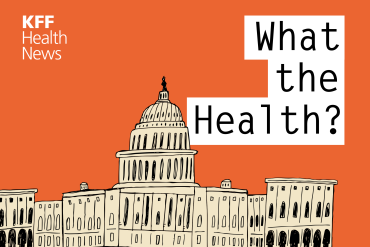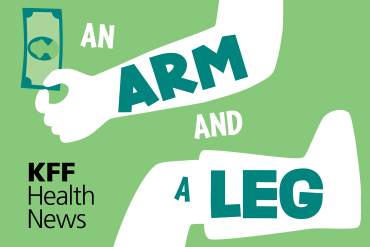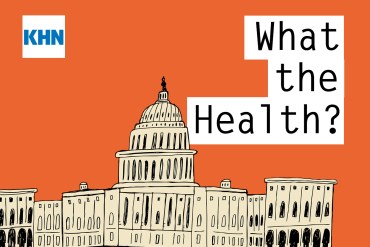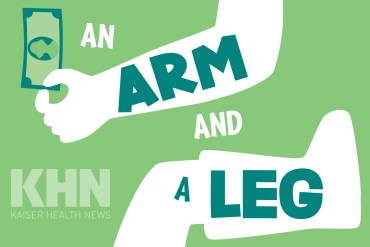KFF Health News' 'What the Health?': Dancing Under the Debt Ceiling
House Republicans passed their plan to raise the nation’s debt ceiling, along with major cuts to health (and other domestic) programs. Unlikely to become law, it calls for new work requirements for adults on Medicaid. Meanwhile, state efforts targeting trans people bear a striking resemblance to the fight against abortion rights. Jessie Hellmann of CQ Roll Call, Shefali Luthra of The 19th, and Sarah Karlin-Smith of the Pink Sheet join KFF Health News chief Washington correspondent Julie Rovner to discuss these issues and more. Also this week, Rovner interviews Renuka Rayasam, who reported the latest KFF Health News-NPR “Bill of the Month” feature, about a specialist’s demand to be paid as much as $15,000 before treating a woman’s serious pregnancy complication.
KFF Health News' 'What the Health?': Will They or Won’t They (Block the Abortion Pill)?
The Supreme Court is considering the future of the abortion pill mifepristone, after GenBioPro sued the FDA over limitations that effectively block generic production of the drug, a major part of the market. Congress is considering proposals that would impose Medicaid work requirements, crack down on pharmacy benefit managers, and more. And President Joe Biden moved to expand health coverage to young immigrants known as “Dreamers.” Rachel Cohrs of Stat, Sandhya Raman of CQ Roll Call, and Joanne Kenen of the Johns Hopkins Bloomberg School of Public Health and Politico join KFF Health News’ Mary Agnes Carey to discuss these issues and more.
An Arm and a Leg: A $229,000 Medical Bill Goes to Court
Lisa French was told her surgery would cost $1,337. But the hospital sent her a bill for $229,000, then sued her. The case went all the way to the Colorado Supreme Court. The court’s ruling could have major implications for determining a “reasonable price” in health care.
KFF Health News' 'What the Health?': The Confusing Fate of the Abortion Pill
The legality and availability of the abortion pill mifepristone is in question after a federal judge in Texas canceled the FDA’s approval of the first drug used in the two-drug medication abortion regimen. A 5th Circuit Court of Appeals panel overruled that decision in part, saying the pill should remain available, but only under the onerous restrictions in place before 2016. Meanwhile, another federal judge in Washington state issued a ruling in a separate case that conflicts with the Texas decision, ordering the FDA not to roll back any of its restrictions on the drug. Victoria Knight of Axios, Shefali Luthra of The 19th, and Sarah Karlin-Smith of the Pink Sheet join KFF Health News chief Washington correspondent Julie Rovner to discuss these issues and more.
As of April 1, states were allowed to begin reevaluating Medicaid eligibility for millions of Americans who qualified for the program during the covid-19 pandemic but may no longer meet the income or other requirements. As many as 15 million people could lose health coverage as a result. Meanwhile, the Medicare Hospital Insurance Trust Fund is projected to stay solvent until 2031, its trustees reported, taking some pressure off of lawmakers to finally fix that program’s underlying financial weaknesses. Alice Miranda Ollstein of Politico, Rachel Roubein of The Washington Post, and Amy Goldstein of The Washington Post join KHN’s Julie Rovner to discuss these issues and more. Also this week, Rovner interviews Daniel Chang, who reported the latest KHN-NPR “Bill of the Month” feature about a child not yet old enough for kindergarten whose medical bill landed him in collections.
An Arm and a Leg: A Doctor’s Love Letter to ‘The People’s Hospital’
Could a charity hospital founded by a crusading Dutch playwright, a group of Quakers, and a judge working undercover become a model for the U.S. health care system? In this episode of the podcast “An Arm and a Leg,” host Dan Weissmann speaks with Dr. Ricardo Nuila to find out.
KFF Health News' 'What the Health?': A Judicial Body Blow to the ACA
A federal judge in Texas has dealt a big setback to the Affordable Care Act. The same judge who tried in 2018 to declare the entire ACA unconstitutional has now ruled that the law’s main provisions for preventive care are unconstitutional and, therefore, unenforceable nationwide. Also this week, North Carolina became the 40th state to expand Medicaid under the ACA. Alice Miranda Ollstein of Politico, Rachel Cohrs of Stat, and Sandhya Raman of CQ Roll Call join KHN chief Washington correspondent Julie Rovner to discuss these issues and more.
KFF Health News' 'What the Health?': The Policy, and Politics, of Medicare Advantage
Medicare Advantage, the private plan alternative to traditional Medicare, is embroiled in a growing controversy over whether insurers are being overpaid and what it would mean to reduce those payments. Meanwhile, even as maternal mortality in the U.S. continues to rise, providers of care to pregnant women say they’re leaving states with abortion bans that prevent them from treating pregnancy complications. Margot Sanger-Katz of The New York Times, Jessie Hellmann of CQ Roll Call, and Joanne Kenen of the Johns Hopkins Bloomberg School of Public Health and Politico join KHN’s chief Washington correspondent Julie Rovner to discuss these issues and more.
KFF Health News' 'What the Health?': Judging the Abortion Pill
Any day now a conservative federal judge in Texas could upend the national abortion debate by requiring the FDA to rescind its approval of mifepristone, a drug approved in the U.S. more than 20 years ago that is now used in more than half of abortions nationwide. Meanwhile, a controversial study on masks gets a clarification, although it may be too late to change the public impression of what it found. Alice Miranda Ollstein of Politico, Jessie Hellmann of CQ Roll Call, and Sarah Karlin-Smith of the Pink Sheet join KHN chief Washington correspondent Julie Rovner to discuss these issues and more. Plus, for “extra credit,” the panelists suggest health policy stories they read this week they think you should read, too.
An Arm and a Leg: Wrestling With a Giant: How to Dispute a Hospital Bill
One listener tried to dispute a $1,300 “facility fee” with the treating hospital, his insurer, a bill-mediation service provided by his employer, and finally a debt collector. He didn’t win, but he learned valuable lessons about advocating for hospital discounts.
KFF Health News' 'What the Health?': Biden Budget Touches All the Bases
Very little in the proposed budget released by the Biden administration is likely to become law, particularly with Republicans in charge of the U.S. House. Still, the document is an important statement of the president’s policy priorities, and it’s clear health programs are among those he feels are important. Meanwhile, five women who were denied abortions when their pregnancies threatened their lives are suing Texas. Shefali Luthra of The 19th, Victoria Knight of Axios, and Margot Sanger-Katz of The New York Times join KHN’s Julie Rovner to discuss these issues and more. Also this week, Rovner interviews Harris Meyer, who reported and wrote the two latest KHN-NPR “Bill of the Month” features. Both were about families facing unexpected bills following childbirth.
KFF Health News' 'What the Health?': March Medicaid Madness
President Joe Biden and Republicans in Congress spent last month sparring over whether to shield Medicare and Social Security from budget cuts — leading some to wonder if Medicaid was on the table instead. Biden and Democrats say no, but some Republicans seem eager to trim federal spending on the health program for Americans with low incomes. And ready or not, artificial intelligence is coming to medical care. Benefits, as well as unintended consequences, are likely. Alice Miranda Ollstein of Politico, Rachel Cohrs of STAT News, and Lauren Weber of The Washington Post join KHN’s chief Washington correspondent, Julie Rovner, to discuss these issues and more.
KFF Health News' 'What the Health?': Senators Have Mental Health Crises, Too
When U.S. Sen. John Fetterman of Pennsylvania checked himself into the Walter Reed National Military Medical Center for treatment of depression this month, he got an unusual reaction from his colleagues in Congress: compassion. It’s a far cry from how politicians once kept their mental health issues under wraps at all costs. Meanwhile, GOP presidential candidate Nikki Haley is stirring up controversy by proposing that all politicians over age 75 be required to pass a mental competency test to hold office. Joanne Kenen of the Johns Hopkins Bloomberg School of Public Health and Politico, Sarah Karlin-Smith of the Pink Sheet, and Rachel Roubein of The Washington Post join KHN chief Washington correspondent Julie Rovner to discuss these issues and more. Plus, for “extra credit,” the panelists suggest health policy stories they read this week that they think you should read, too.
KFF Health News' 'What the Health?': The Kids Are Not OK
A new survey from the Centers for Disease Control and Prevention finds that teenagers, particularly girls, are reporting all-time high rates of violence and profound mental distress. Meanwhile, both sides in the abortion debate are anxiously waiting for a district court decision in Texas that could effectively revoke the FDA’s 22-year-old approval of the abortion pill mifepristone. Alice Miranda Ollstein of Politico, Sandhya Raman of CQ Roll Call, and Joanne Kenen of the Johns Hopkins Bloomberg School of Public Health and Politico join KHN’s chief Washington correspondent, Julie Rovner, to discuss these issues and more.
An Arm and a Leg: She Sued a Hospital and Lost — But Felt She’d Won
A listener sued a hospital in small-claims court and lost but felt as if she’d won. Now, she wants to encourage more people to take their bills to court.
KFF Health News' 'What the Health?': A Health-Heavy State of the Union
President Joe Biden’s 2023 State of the Union address leaned heavily on health care issues. Biden took a victory lap for recent accomplishments like capping prescription drug costs for seniors on Medicare. He also urged Congress to make permanent the boosted premium subsidies under the Affordable Care Act, and he sparred with Republicans on threats to cut Social Security and Medicare. Also this week, both sides in the abortion debate are bracing for a court decision out of Texas that could, at least temporarily, make the abortion pill mifepristone illegal nationwide. Alice Miranda Ollstein of Politico, Rachel Cohrs of Stat, and Sarah Karlin-Smith of the Pink Sheet join KHN chief Washington correspondent Julie Rovner to discuss these issues and more. Also this week, Rovner interviews Kate Baicker of the University of Chicago about a possible middle ground in the effort to get universal health insurance coverage.
KFF Health News' 'What the Health?': Au Revoir, Public Health Emergency
The Biden administration this week announced it would let the covid-19 public health emergency lapse on May 11, even as the Republican-led House was voting to immediately eliminate the special authorities of the so-called PHE. Meanwhile, anti-abortion forces are pressuring legislators to both tighten abortion restrictions and pay for every birth in the nation. Margot Sanger-Katz of The New York Times, Rachel Roubein of The Washington Post, and Victoria Knight of Axios join KHN’s chief Washington correspondent Julie Rovner to discuss these issues and more. Also this week, Rovner interviews Hannah Wesolowski of the National Alliance on Mental Illness about the rollout of the national 988 suicide prevention hotline.
An Arm and a Leg: Can They Freaking Do That?!? (2023 Update)
Can a medical provider you’ve never heard of send you an outrageous bill? Sure. Can you fight back and win? Yes, sometimes you can. Here’s how to do it.
KFF Health News' 'What the Health?': Part II: The State of the Abortion Debate 50 Years After ‘Roe’
In Part II of this special two-part episode, Alice Miranda Ollstein of Politico, Sandhya Raman of CQ Roll Call, and Sarah Varney of KHN join KHN chief Washington correspondent Julie Rovner to discuss how the abortion debate has evolved since the Supreme Court overturned the nationwide right to abortion in 2022, and what might be the flashpoints for 2023. Also, for extra credit, the panelists recommend their most memorable reproductive health stories from the last year.
Part I: The State of the Abortion Debate 50 Years After ‘Roe’
In Part I of this special two-part episode, Alice Miranda Ollstein of Politico, Sandhya Raman of CQ Roll Call, and Sarah Varney of KHN join KHN chief Washington correspondent Julie Rovner to discuss how the abortion debate has evolved since the Supreme Court overturned the nationwide right to abortion in 2022, and what might be the flashpoints for 2023. Also in this episode, Rovner interviews Elizabeth Nash of the Guttmacher Institute, about changing reproductive policies in the states.










